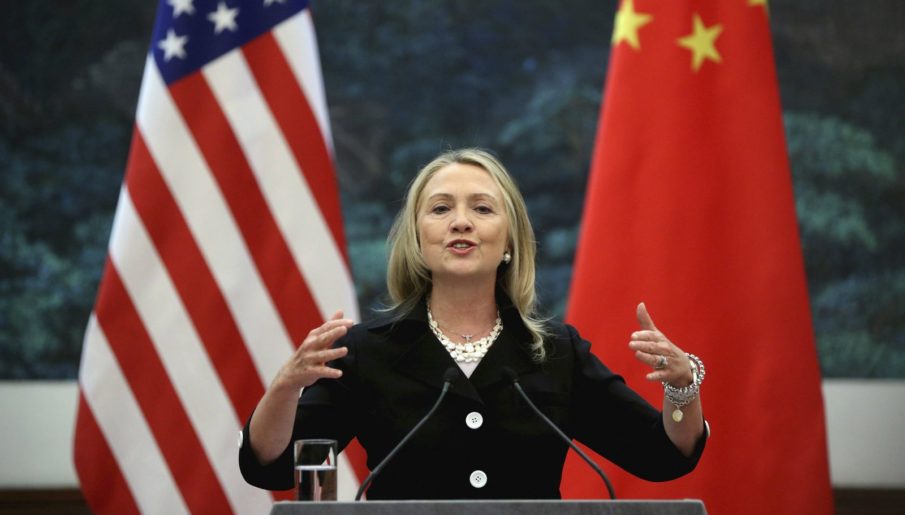In a sworn deposition released by Judicial Watch, Cheryl Mills, one of then-Secretary of State Hillary Clinton’s aides, reads an email exchanged between Clinton and a third aide:
And some of these are just aggregated. Because this second email page is actually still in the same traffic. It starts with the same, for future reference, this is my — my Gmail. Thanks. And then she has the same thing, that’s all I have. And then it says, you’ve always emailed me on my State [Department-issued email]. And then it says, weird, since my address book has your Gmail. Maybe the Chinese hacked it. And focuses on you. Which at least I interpret as a joke. (page 139)
Few things are more surreal than sworn testimony about a then-sitting secretary of state not only using a private email server as a parallel communications platform to get around official government correspondence, but also joking about the Chinese hacking that email server, which almost certainly happened.
Displaying incredible hubris, Hillary Clinton enjoyed the power and prestige of public office while also scorning the transparency aspects of being a civil servant. That hubris (and insecurity, as evidenced in other emails that display her paranoia about how she is portrayed in the media) led then-Secretary of State Clinton to create an alternate and unofficial communications platform, enabling her to avoid both Freedom of Information Act (FOIA) requests and potential Department of Justice investigations.
Considering China’s pervasive hacking of U.S. government and commercial databases, there is a serious question as to how many intelligence and counterterrorism operations have been compromised by foreign powers due to Clinton’s lackadaisical, and probably criminal, use of non-secured communications. “Hillary Clinton’s private email server containing tens of thousands of messages from her tenure as secretary of state—including more than 400 now considered classified—was the subject of hacking attempts from China, South Korea and Germany after she stepped down in 2013, according to congressional investigators,” Politico reported.
Contrary to Clinton’s tongue-in-cheek email about the Chinese hacking her communications, this is no laughing matter. Consider that this was the same private email server with which she received off-the-books intelligence reports about the situation in Libya during the American-led armed intervention that ousted Muammar Gaddafi.
Hints at how Clinton may have compromised counterterrorism operations, particularly in the Philippines, have also come to light in recent days.
American special operations forces working with Filipino-trained special operations troops were frustrated, as on multiple occasions they developed actionable intelligence on the Islamic terrorist organization Abu Sayyaf only to have their operations compromised and their targets disappear just before their raids. The Filipino SOF unit was switched out with another in an effort to squash any leaks from the host-nation forces, but again, word reached the Abu Sayyaf targets before the SOF elements arrived. The Filipinos must have been scratching their heads, knowing they were innocent of any OPSEC violations.
In a move reminiscent of MACV-SOG teams in Vietnam, the American special operations advisors in the Philippines stopped telling the U.S. State Department that they were going on raids. Amazingly, they began capturing and killing their targets. In the early 1970s, Studies and Observations Group (SOG) Special Forces soldiers found themselves getting blown out of every landing zone they tried to insert on, and were then constantly dogged by the North Vietnamese Army while they were on the ground. Suspecting a leak in Saigon, the Green Berets began sending up false grids to higher to avoid having their missions compromised. Similar to the situation in the Philippines, the OPSEC compromises suddenly went away. Years later, it was proved that there was, in fact, a communist mole in Military Assistance Command at Saigon.
Around the same time that the counterterrorism missions in the Philippines were compromised, “a U.S. special operations unit was tracking agents from the United Arab Emirates, who were suspected of buying advanced remote-control bomb devices from China to use against U.S. troops in Iraq. Their main smuggling route led through Thailand. U.S. counterterrorism agents set a trap for them in Bangkok,” Newsweek reported. Behind the scenes, it has been well known in certain circles of the intelligence community that microchips used in the construction of IEDs that killed Americans in Iraq originated in China. The Bangkok operation was also compromised, the Arab IED facilitators having been tipped off.
One U.S. government employee has gone public about his concerns regarding then-Secretary Clinton and her staff blatantly using “work-arounds” to bypass the use of classified communications systems and transmit information over non-secured networks.
Already have an account? Sign In
Two ways to continue to read this article.
Subscribe
$1.99
every 4 weeks
- Unlimited access to all articles
- Support independent journalism
- Ad-free reading experience
Subscribe Now
Recurring Monthly. Cancel Anytime.










COMMENTS